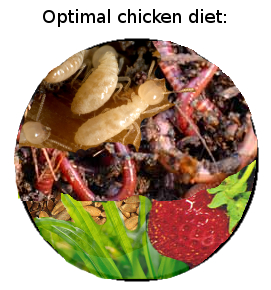
A healthy and cheap chicken diet
 How
can a backyard chicken keeper provide her chickens with the most
nutritious and cheap feed? First of all, let me admit that we
still feed our chickens on laying pellets from the feed store.
But we do supplement our feed with other things and are trying to move
toward minimizing the amount of storebought feed we use.
How
can a backyard chicken keeper provide her chickens with the most
nutritious and cheap feed? First of all, let me admit that we
still feed our chickens on laying pellets from the feed store.
But we do supplement our feed with other things and are trying to move
toward minimizing the amount of storebought feed we use.
Storebought chicken feed
is made up of grains and soybeans, but Jungle
Fowl (the
ancestor of the chicken) feed primarily on
insects.
Scientists who cut open the crops of wild Jungle Fowl found that half
or more of the mashed up food in there was typically insects and other
invertebrates (especially termites.) Various plant matter was
also represented, especially fruits, berries, bamboo seeds, nuts, and
young leaves.
The upshot is clear ---
if we want to wean ourselves off a dependence
on store-bought chicken feed, we shouldn't be planting rows of wheat
and barley. Instead, we need to find ways to provide our chickens
with copious insects. Our chickens eat some insects, both the
ones they find when I move the tractor every morning and the ones I
hand deliver to their enclosures. But several people have
suggested larger scale insect feed operations. Check out some of
these links, for example:
- Fred's Fine Fowl shows you how to trap those Japanese Beetles decimating your roses and feed them to your chickens.
- My idol, Harvey Ussery, breeds both fly maggots and earthworms to feed his chickens.
- Mark has posted before about the option of raising mealworms for your chickens.
I'm a bit leery since you have to grow the mealworms in storebought
materials.
Has anyone given these
ideas a shot? I would really like to come up with a large-scale
method of breeding invertebrates for our chickens to at least take over
the summer feeding.
 This post is part of our Chicken Trivia lunchtime series.
Read all of the entries: This post is part of our Chicken Trivia lunchtime series.
Read all of the entries: |
While you're improving your chickens' health, you should make sure
they have clean water, an easy task with our homemade chicken
waterer.
Want more in-depth information? Browse through our books.
Or explore more posts by date or by subject.
About us: Anna Hess and Mark Hamilton spent over a decade living self-sufficiently in the mountains of Virginia before moving north to start over from scratch in the foothills of Ohio. They've experimented with permaculture, no-till gardening, trailersteading, home-based microbusinesses and much more, writing about their adventures in both blogs and books.
Want to be notified when new comments are posted on this page? Click on the RSS button after you add a comment to subscribe to the comment feed, or simply check the box beside "email replies to me" while writing your comment.

Hi, There is no need to use special commercial feeds for mealworms. You can use ground cornmeal, ground soybeans, flours, oats. I raise them in my apt. In the city. They are very easy to raise. Put in a chunks of apple or carrot, or potato changing every day to a couple fresh pieces. I wouldn't be at all surprised if you can use ground chicken feed. gentle day, Lisa
What about drone bees, if you have a beehive. They are larger and stingless, and don't help collect honey. Drone traps have been devised to remove drones from a hive, because they are perceived as useless. No feeding required - bees travel miles to collect their own nectar and pollen. Theres a lot of protein in bees - try smelling some after they have been dead a few days.
The uselessness of drones is a bit debatable. I tend to believe in letting nature take its course whenever possible, so I keep all of my drones and use other management techniques to cut down on varroa mites.
That said, I have pondered feeding bees to chickens, especially when the hive shuts out large quantities of its workers and drones after cold weather hits. But whenever I scoop up those dead adult bees to give to my chickens, they turn up their beaks. I'll bet they'd eat larvae, but adult bees don't seem to be their cup of tea.
Thats interesting that chickens won't eat dead bees. Maybe they just associate bees (dead or alive) with a painful sting (dead bees can still sting). I have seen wild birds eat bees : A butcherbird (Australian) often sits above my hive and catches an occasional bee in flight. It seems to take a long time to choose a victim - I think maybe it has learnt to recognise the larger stingless drones. Also magpies have learnt how to grab a bee and rub the stinger off, before swallowing. There are some very clever birds !